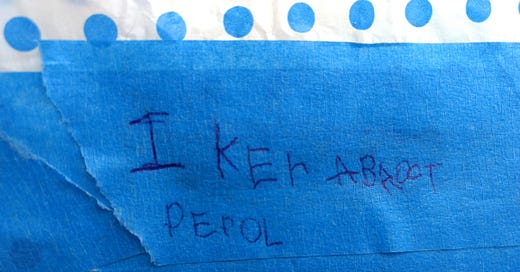Model! Model! Model!
It’s been a mantra of mine since my son was one when I first began integrating the principles of RIE into our home.
The basic principle of modeling is this:
Modeling is authentic behavior, not performative behavior.
So, modeling is more brushing my teeth on my own schedule - as soon as I get up in the morning, after breakfast, after lunch and before bed - because that’s when I want to brush, and less brushing my teeth in the hope that my kiddos will want to brush their teeth too.
Modeling is working on my own difficulties in responding rather than reacting, rather than requiring the children to have control over their own reactions.
Modeling is more acting on my love of reading by, well, reading, and less picking up a book and sighing, “I just love reading,” hoping it will inspire them to practice today.
Modeling is more saying, “thank you,” when I am grateful for something and less prompting the children to say “thank you”.
Modeling is using table manners that serves the whole gathering because I want to be respectful, generous and kind, and less performing the “table manners” I was taught, in the hopes the kiddos will notice them.
Yeah, but kids can’t tell, right? They don’t know when we’re being authentic.
Yes, they can and they do. Yes. Yes. And yes. They know. Do you ever have the sense your kids are tuning forks for your energy? They know. Even teeny tiny babies know.
Modeling is more:
“You know, I’d really love to hear a thank you now and then. It would help me to hear you acknowledge what I do for you.”
And less turning the “thank you” into a transactional moment where I don’t give them what they want until they say “thank you”.
In the above, I’m modeling open, honest communication about how I am rather than a power-over strategy.
Modeling is more:
“I am so sorry that I yelled this morning. I imagine that was scary and you wish you were feeling safe. Is that true?”
And less: “In this house we apologize!”
When we are inauthentic, we model inauthenticity.
When we are authentic, we build trust.* What we model, we teach.
How has this been to read?
*May unintentionally also meet needs for respect, consideration, being seen, being understood, connection, mattering, belonging.
Have you subscribed yet?





Yes! I am so with you. It's like the writing dictum of "show don't tell." Occasionally I hear my teens speaking empathetically to friends--not just kindly but using true empathy--or announcing "my needs for belonging just weren't met" after being in some social situation that was hard. And I think: Modeling, yes.